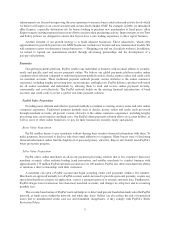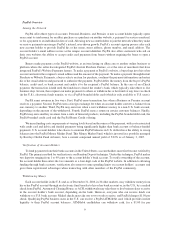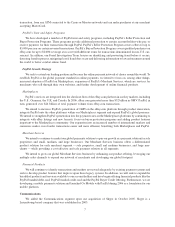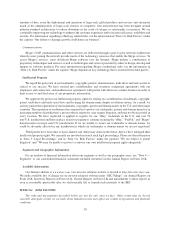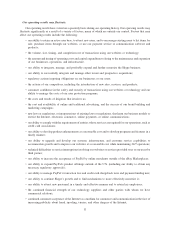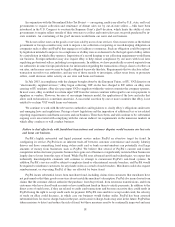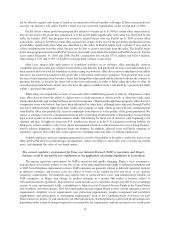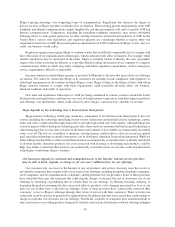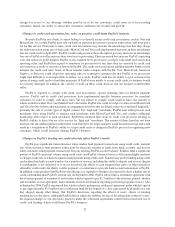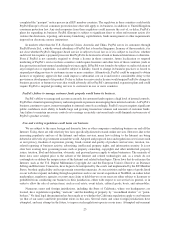eBay 2006 Annual Report Download - page 19
Download and view the complete annual report
Please find page 19 of the 2006 eBay annual report below. You can navigate through the pages in the report by either clicking on the pages listed below, or by using the keyword search tool below to find specific information within the annual report.Government inquiries may lead to charges or penalties.
A large number of transactions occur on our websites. We believe that government regulators have received a
substantial number of consumer complaints about both eBay and PayPal, which, while small as a percentage of our
total transactions, are large in aggregate numbers. As a result, we have from time to time been contacted by various
foreign and domestic governmental regulatory agencies that have questions about our operations and the steps we
take to protect our users from fraud. PayPal has received inquiries regarding its restriction and disclosure practices
from the Federal Trade Commission regarding these and other business practices from the attorneys general of a
number of states. In September 2006, PayPal entered into a settlement agreement with the attorneys general of a
number of states under which it agreed to pay $1.7 million to the attorneys general, shorten and streamline its user
agreement, increase educational messaging to users about funding choices, and communicate more information
regarding protection programs to users. Both eBay and PayPal are likely to receive additional inquiries from
regulatory agencies in the future, which may lead to action against either company. We have responded to all
inquiries from regulatory agencies by describing our current and planned antifraud efforts, customer support
procedures, operating procedures and disclosures. If one or more of these agencies is not satisfied with our response
to current or future inquiries, we could be subject to enforcement actions, fines or other penalties, or forced to
change our operating practices in ways that could harm our business.
We are subject to laws relating to the use and transfer of personally identifiable information about our users,
especially for financial information and for users located outside of the U.S. New laws in this area have been passed
by several jurisdictions, and other jurisdictions are considering imposing additional restrictions. Violation of these
laws, which in many cases apply not only to third-party transactions but also to transfers of information between
ourselves and our subsidiaries, and between ourselves, our subsidiaries, and other parties with which we have
commercial relations, could subject us to significant penalties and negative publicity and could adversely affect us.
The listing or sale by our users of pirated or counterfeit items may harm our business.
We have received in the past, and we anticipate receiving in the future, communications alleging that certain
items listed or sold through our service by our users infringe third-party copyrights, trademarks and trade names, or
other intellectual property rights. Although we have sought to work actively with the owners of intellectual property
rights to eliminate listings offering infringing items on our websites, some rights owners have expressed the view
that our efforts are insufficient. Content owners and other intellectual property rights owners have been active in
asserting their rights against online companies, including eBay. Allegations of infringement of intellectual property
rights have resulted in litigation against us from time to time, including litigation brought by Tiffany & Co. and
Robespierre, Inc. (doing business as Nanette Lepore) in the U.S., Rolex S.A. in Germany, Louis Vuitton Malletier
and Christian Dior Couture in France, and a number of other owners of intellectual property rights. The plaintiffs in
these cases seek to hold eBay liable for counterfeit items listed on our sites by third parties, for the misuse of
trademarks in listings or in connection with paid search advertisements, or for alleged violations of selective
distribution channel laws. Tiffany seeks, among other things, injunctive relief and damages. A trial in the Tiffany
case has been scheduled for May 2007. Nanette Lepore sought, among other things, to require eBay to block all
listings offering Nanette Lepore items, as well as damages. The court denied Nanette Lepore’s request for a
preliminary injunction, and found that eBay’s process for addressing the listing of counterfeit items by third parties
on its site was both reasonable and adequate. Nanette Lepore initially appealed the ruling, but subsequently
abandoned its appeal. Other luxury brand owners have also filed suit against us or have threatened to do so. In
addition, we may be subject to criminal penalties if the authorities feel we have aided in the sale of counterfeit
goods. While to date we have been largely successful in defending against such litigation, more recent cases have
been based, at least in part, on different legal theories than those of earlier cases, and there is no guarantee that we
will continue to be successful in defending against such litigation. In particular, plaintiffs in recent cases have
argued that we are not entitled to safe harbors under the Digital Millennium Copyright Act in the U.S. or as a hosting
provider in the European Union because of the active nature of our involvement with our sellers, and that, whether
or not such safe harbors are available, we should be found liable because we have not adequately removed
counterfeit listings or effectively suspended users who have created such listings. In addition, a public perception
that counterfeit or pirated items are commonplace on our site could damage our reputation and our business.
Litigation and negative publicity may increase as our sites gain prominence in markets outside of the U.S., where
15


